Neurological surgery residency


The Corewell Health – Grand Rapids/Michigan State University Neurological Surgery Residency is committed to producing highly qualified neurosurgeons who have the confidence to undertake their craft of clinical decision-making and surgical expertise with distinction. The program is currently a seven-year program with access to all neurosurgical sub-specialties.
Training is conducted at Butterworth Hospital, Blodgett Hospital and Helen DeVos Children’s Hospital. A large array of technical assets in both diagnostic and therapeutic domains, coupled with the clinical expertise of specialty-focused staff, serve to supplement the training experience to prepare trainees for future practice
Overview
The Department of Neurological Surgery consists of 16 senior surgeons. These surgeons are sub specialized in the major neurosurgical fields including neuro-oncology, functional, pediatric, vascular (open and endovascular) and spine. The are supported by 18 APPs and a large body of technical staff.
Our hospitals are equipped with the latest neurosurgical technologies, advancing the training of our residents and providing the highest quality of care for our patients. These include: iMRI, hybrid angiographic suites, Leica and Zeiss operating microscopes, ROSA and Mazor robotic systems, Storz Neuroendoscopic system, Visualase LITT, NICO Myriad/Brain Path, O-arm, Starfix and Leksell stereotactic frames, Clearpoint system, StealthStation navigation systems, Artis Q biplane systems, Novalis Tx stereotactic radiosurgery system and 3D exoscope system.
The Department of Neurological Surgery is a subsidiary of the Corewell Health Department of Clinical Neurosciences which incorporates neurology, neurosurgery, physical medicine and rehabilitation, neuropsychology, clinical psychology and pain management and has over 150 senior faculty and advanced practice providers. Several programs constitute the department – oncology, vascular, epilepsy, spine, movement disorder, neuromuscular, behavioral/cognitive, immunological – bringing together an interdisciplinary team to manage conditions by the relevant expertise.
Program aims
- Teaching technical competency in clinical and surgical neuroscience skills
- Inculcating the spirit of putting the patient’s need first by practicing evidence based and ethical decision making
- Incorporating a culture of teaching and innovation
- Committing to researching new age solutions to clinical problems through bedside to bench to bedside approach
Training locations
- Corewell Health Grand Rapids Hospitals Butterworth Hospital - Level 1 Trauma Center and Comprehensive Stroke Center; over 800 beds, a Neurocritical Care Unit, dedicated Neuroangiography suites and operating facilities with state-of-the-art technical assets
- Corewell Health Grand Rapids Hospitals Blodgett Hospital - site for the majority of elective spine surgery
- Corewell Health Grand Rapids Hospitals Helen DeVos Children’s Hospital – site providing for entire scope of pediatric neurosurgical procedures
Education and research
The educational environment at Corewell Health in West Michigan provides sufficient exposure in all neurosurgical domains. Through its resources and commitment to excellence, the program provides the means by which high caliber graduates may be recruited within the department to perpetuate a strong academic standard and clinical performance.
Furthermore, the residents have a year-round access to various facilities such as animal labs for vascular anastomosis training, cadaver labs for spine and skull base procedures and benchside training microscope to practice and improve their surgical skills.
Research is supported by the Corewell Health Research Institute and collaborations are established with several research enterprises, including Michigan State University, Van Andel Institute and Grand Valley State University. Opportunities exist to establish clinical and translational research projects in collaboration within the Department of Clinical Neurosciences, as well as with faculty in these neighboring institutions. Departmental faculty are engaged in several clinical trials, government-supported projects and graduate studies programs.
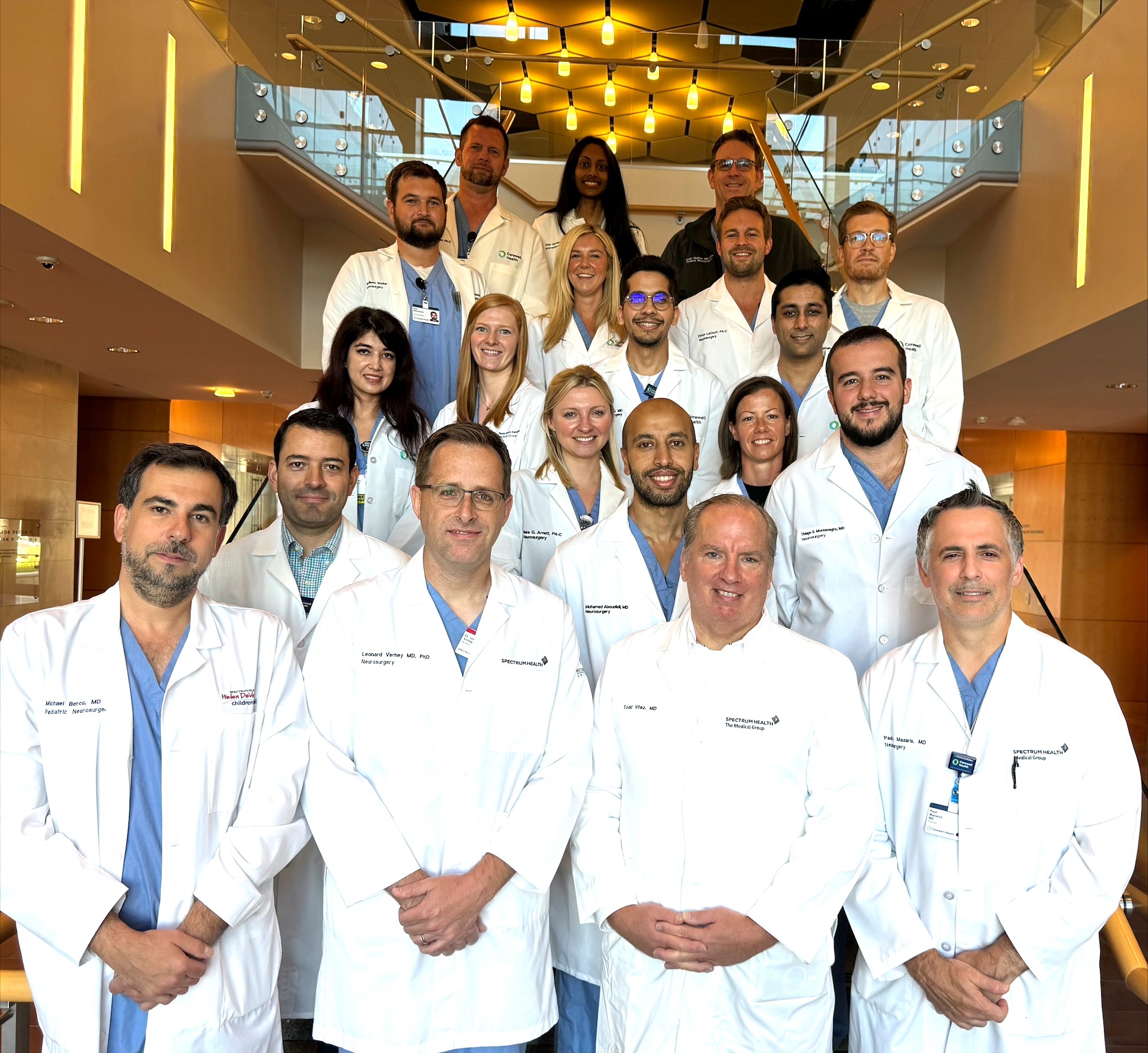
Didactics
There is a structured weekly didactic schedule that occurs during protected education time outside of clinical responsibilities and includes:
- Primary didactic hour: Lecture/presentation by both residents and faculty
- Secondary didactic hour: Case studies, neuroanatomy review, labs/workshops
- 1st Wednesday of the month: Duty hours, case log, & resident concerns discussed
- 3rd Wednesday of the month: Morbidity and mortality discussions
Additional resident meetings:
- Monthly journal clubs held at either faculty homes or restaurants
- Monthly research review meetings with Dr. Singer & Dr. Bercu
- Quarterly mentor meetings with respective faculty
Simulation and skills labs:
- Skull base lab with Dr. Vitaz and Dr. Mazaris – occurs in February and September
- Microvascular anastomosis rat lab with Dr. Mazaris and Dr. Singer – occurs quarterly
- Endovascular lab with Dr. Mazaris, Dr. Singer, and Dr. Somji – July and January
- Cortical topography and temporal lobe anatomy lab with Dr. Somji and Dr. Patra – October and May
- Spine anatomy/instrumentation lab with Dr. Karek and Dr. Googe – September and November
Teaching opportunities
Through its collaboration with the Michigan State University, the Department of Neurological Surgery at Corewell Health in West Michigan provides multiple resources for residents and medical students to advance their knowledge and surgical skills.
The department offers a robust sub internship for medical students interested in experiencing the full breadth of neurosurgical care and its various sub specialties. For more information on this, please feel free to contact our program coordinator.
Additionally, faculty and residents also serve as advisors to the Neurosurgery Interest Group (NSIG) currently being run by medical students at the Michigan State University. This collaboration provides medical students access to the various educational activities of the department including didactic sessions, labs, workshops etc. as well as an opportunity to work closely with residents and faculty on various projects both research based and otherwise.
Application requirements
- All candidates must possess U.S. work authorization or be eligible for J-1 status.
- For DO applicants, we prefer USMLE Steps 1 and 2, but will accept COMLEX 1 and 2.
For more information contact Tarra Geertman, program coordinator or email us at neurosurgery@corewellhealth.org.
All visiting medical student applications must be submitted through the Visiting Student Learning Opportunities program (formerly known as VSAS). For more information on visiting medical student opportunities, please visit the Visiting Learner page.
Salary and benefits
Explore West Michigan


Food: Release your inner foodie exploring one of the top food cities in the US.
Entertainment: From zoos and museums to festivals and art, there is a new experience around every corner.
Shopping: West Michigan has a diverse assortment of shops for everyone.

Outdoors: With trails, lakes and more, there is so much of West Michigan to explore.
Sustainability: Located along the shore of Lake Michigan, West Michigan has many initiatives to protect our natural resources.

Identities matter and so do you! Our residency and fellowship programs offer social activities, wellness programs and a diversity council to foster respect, personal health and community.
Program Director
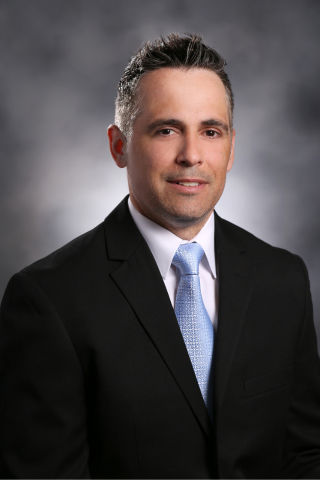
Neurosurgeon
- Specialty: Cerebrovascular Neurosurgery
- Fellowship: Hartford Hospital
- Residency: Henry Ford Hospital Health System

Neurosurgeon
- Specialty: Cerebrovascular Neurosurgery
- Fellowship: Hartford Hospital
- Residency: Henry Ford Hospital Health System
Associate Program Director
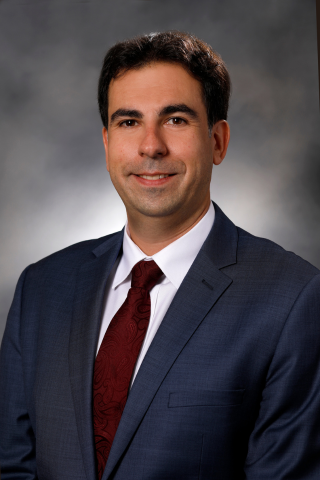
Pediatric Neurosurgeon
- Specialty: Pediatric and Functional Neurosurgery
- Fellowship: New York University Medical Center (dual fellowships in pediatrics and functional neurosurgery)
- Residency: Sourasky Medical Center

Pediatric Neurosurgeon
- Specialty: Pediatric and Functional Neurosurgery
- Fellowship: New York University Medical Center (dual fellowships in pediatrics and functional neurosurgery)
- Residency: Sourasky Medical Center
Core Faculty
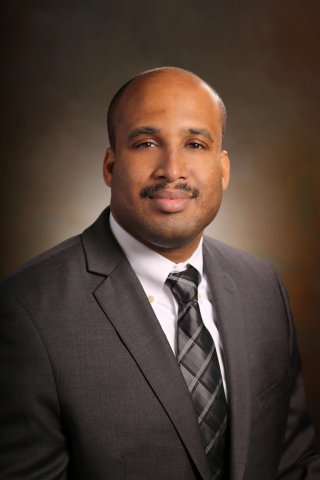
Neurosurgeon
- Specialty: Deep brain stimulation and pain
- Residency: Henry Ford Hospital Health System
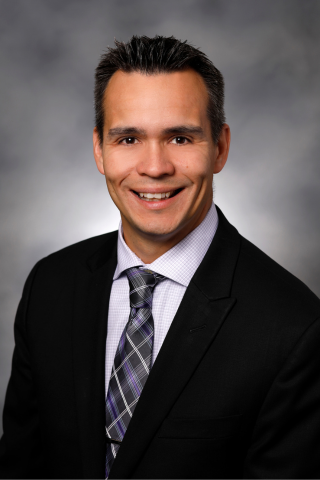
Neurosurgeon
- Specialty: Spine
- Residency: Midwestern University, Advocate BroMenn Medical Center
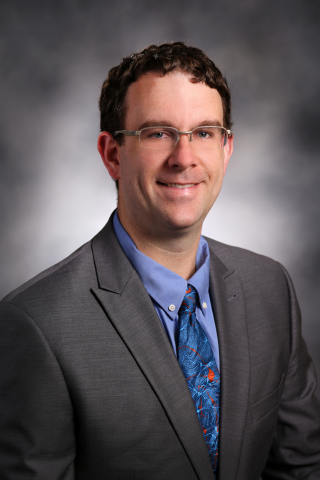
Pediatric Neurosurgeon
- Specialty: Pediatric Neurosurgery
- Fellowship: University of Alabama at Birmingham
- Residency: University of Wisconsin Hospital and Clinics
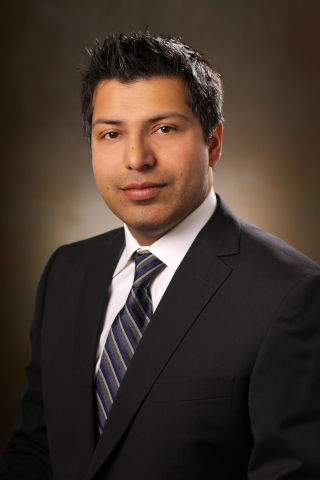
Neurosurgeon
- Specialty: Epilepsy
- Residency: Henry Ford Hospital Health System

Neurosurgeon
- Specialty: Deep brain stimulation and pain
- Residency: Henry Ford Hospital Health System

Neurosurgeon
- Specialty: Spine
- Residency: Midwestern University, Advocate BroMenn Medical Center

Pediatric Neurosurgeon
- Specialty: Pediatric Neurosurgery
- Fellowship: University of Alabama at Birmingham
- Residency: University of Wisconsin Hospital and Clinics

Neurosurgeon
- Specialty: Epilepsy
- Residency: Henry Ford Hospital Health System
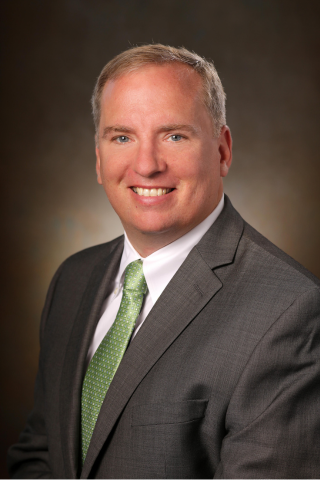
Neurosurgeon
- Specialty: Tumors of the brain, skull base and spine
- Fellowship: Memorial Sloan-Kettering Cancer Center
- Residency: University of Louisville
PGY 1
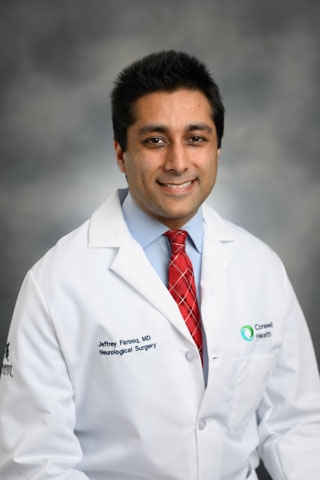
USF Health Morsani

USF Health Morsani
PGY 2
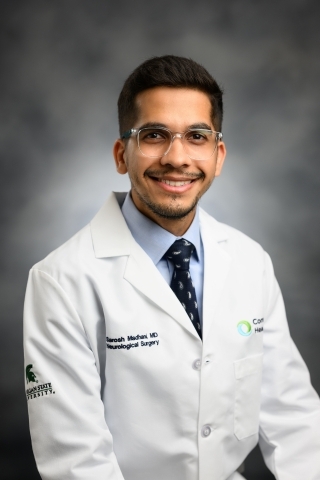
Aga Khan Medical College

Aga Khan Medical College
PGY 3
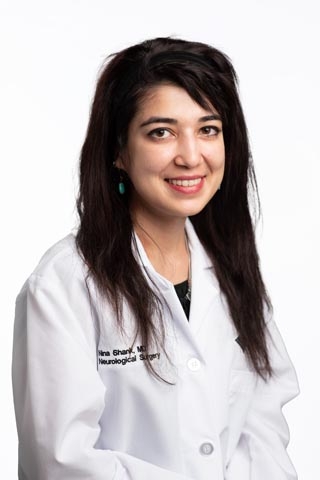
Tulane University

Tulane University
PGY 4
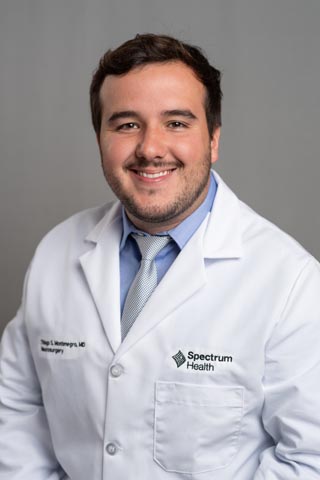
Universidade Federal do Estado do Rio de Janeiro

Universidade Federal do Estado do Rio de Janeiro
PGY 5
.jpg)
University of Illinois—Rockford
.jpg)
University of Illinois—Rockford
PGY 6
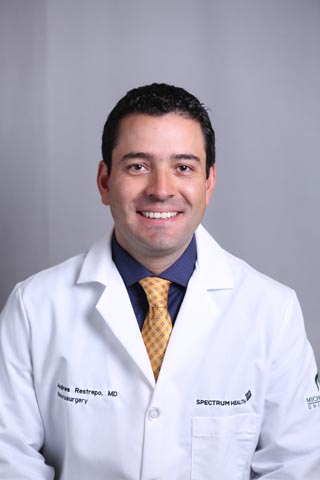
Universidad de Antioquia

Universidad de Antioquia
PGY 7
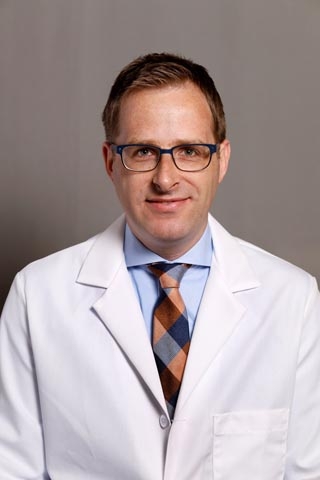
Central Michigan University

Central Michigan University
Neurological surgery residency bios

Ready to Apply?
Review the “Application Requirements” tab on the program page to learn more about the application process.
